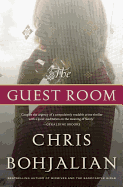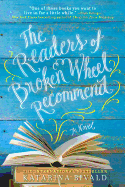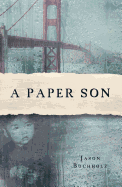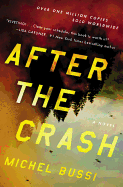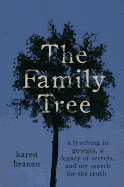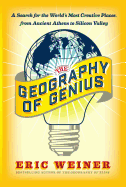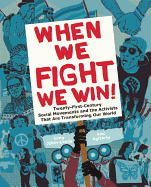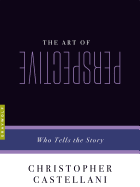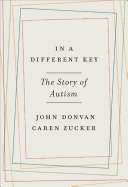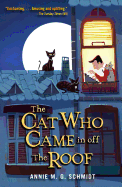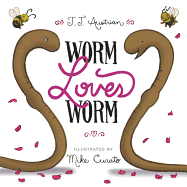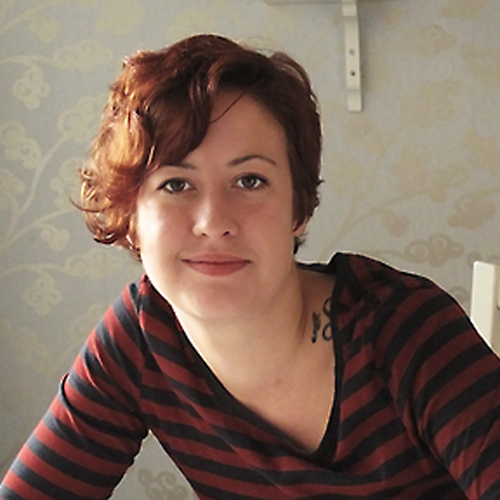 |
| photo: Cecelia Bivald |
Swedish author Katarina Bivald can't remember a time when she wasn't reading. She claims to have always turned to books "for company, support and inspiration," and she grew up working in a bookstore. Therefore, it's fitting that her passion for the printed word and reading wove their way into her first novel, The Readers of Broken Wheel Recommend (in paperback from Sourcebooks Landmark; see our review below). The story centers on a young Swedish woman, a bibliophile, who travels to a run-down Iowa town to visit her book-loving pen pal, only to be met with townsfolk who underestimate the power of books and reading.
Why and how did you become a writer?
I always dreamed about writing a book. But somehow or another, I never gave it any serious effort. When I was 25, after I finished university, I took a job and worked for 10 months to save up some money. Then I spent a month writing full time while traveling around Ireland. It was a great way to get to know my characters.
The truth is, for a long time I never expected this book to be published. I just wrote it as a trial run; writing a complete draft, from Chapter 1 to The End, in order to learn how to write. It didn't have to be good, it would never be published. I just wanted to take any idea and finish it. Since I only wrote it for myself, I decided to fill it with everything I love in books: small American towns, quirky characters, unexpected friendships, love--and books, of course.
Why did you set the novel in the United States?
The best thing about writing a book is that you get to make things up... so it was fun to set things in a small town in Iowa rather than in my own suburb outside of Stockholm. Books should provide some escapism even for the writers. The name of the town, Broken Wheel, came to me one day, complete with the entire history of the town. When I wrote the book, I had never been to Iowa, had never even visited the U.S. But in a way you could say I had grown up there, with Fannie Flagg and Annie Proulx and Louisa May Alcott.
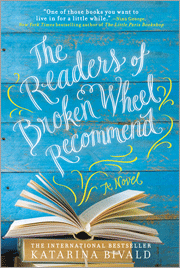 At one time you worked in a bookstore.
At one time you worked in a bookstore.
Yes, but the bookshop I worked at in Sweden was nothing like the bookshop I created in the town of Broken Wheel. In the bookstore where I worked, I spent most of my time trying to read in secret--and sniffing books, of course. It was there I discovered how different books smell. They all share the scent of unread adventure, but there are differences as well: paperbacks smell different from hardcover, English paperbacks smell different from Swedish; classics different from chick-lit, and chick-lit different from crime. School books have their own very distinct scent of forced reading and boring days spent locked in a classroom.
Did you know from the start this novel would be about the power of books and community?
Yes, definitely about the power of community, although the link between books and community took me by surprise. When I started writing the book, I thought working in a bookshop was all about the books. I considered customers a rude interruption in my reading. But when I looked back on all those years in the bookshop, I realized it was actually the people I remembered, which got me thinking about what a bookshop can do to a town and a community that's struggling, failing.
The story is anchored by pen pals. Did you ever have a pen pal?
Nothing that I managed to keep up for any length of time, but I have often lamented the dying art of letter writing. And I have received a touching amount of real letters from people who've read The Readers of Broken Wheel Recommend, including some who've kept up a correspondence with me for months. It's one of the most fun things about having written a book.
Who, in your own life, shares your love of books?
I share my love of books with everyone in my life, whether they like it or not. I have no friends, no lovers, no acquaintances, no family members, who haven't, at one time or another, received a book as a gift from me. Although I'm not sure whether they consider it a gift or a threat ("do tell me what you thought about it").
Do you have any favorite books about books?
I love books about books! Some of my favorites are: Dewey--The Small-Town Library Cat Who Touched the World by Vicky Myron (the reason my book is set in Iowa--who wouldn't want to write a book set in a state that once had a library cat?); 84, Charing Cross Road by Helene Hanff (the touching exchange of letters between a formal, rather stuck-up English bookseller and a very much less formal American woman); The Guernsey Literary and Potato Peel Pie Society (very impressive title).
How have books changed your life?
Sometimes I think books are the reason I'm still single. Having once fallen in love with both Mr. Darcy and Elizabeth Bennet (being a bisexual book lover is a curse), it's very difficult for real people to measure up. Not to mention, real life. It's so... unstructured. God has a lousy sense of plot development.
Your novel has already sold 50,000 copies in Sweden and France and will be published in 25 countries.
Yes, it's been quite a journey. For a long time, I wasn't even sure if it would be published in Sweden, so I never imagined the story or the people in it reaching so many countries. It's a somewhat bizarre thought, that my book has traveled much farther than me.
Has writing this novel, and having it so well received, changed you?
I write full time now, that's the most obvious change. But a more far-reaching change is that I've discovered how unsettling it is to fulfill dreams so very thoroughly. I'm still not used to it. Truman Capote wrote in Answered Prayers about occasions where you don't sacrifice a talisman: "When you have nothing and when you have everything--each is an abyss." So it's been strangely unsettling but, most of all, incomprehensible, in a fun, refreshing sort of way. It has made me experience things I had never even imagined, and as I get older, I find truly strange experiences surprisingly rare.
Are you writing another book?
I am indeed. My second novel was published in Sweden this year, called Life, Motorcycles and Other Impossible Projects. It's about a single mother whose idea of time shifts when her only daughter moves to a different town to study. Eventually she starts taking motorcycle lessons, gets involved in an impossible project, falls for her motorcycle instructor (even more impossible) and eventually discovers just how complicated dreams and freedom can be.
My third book is much more unclear. At the moment, it's taking place in a fictional town in Oregon, so now when I look outside the window I see not the tiny Swedish pine trees, but the more magnificent Oregon ones. --Kathleen Gerard, blogger at Reading Between the Lines
Katarina Bivald: Books--The Scent of Unread Adventures
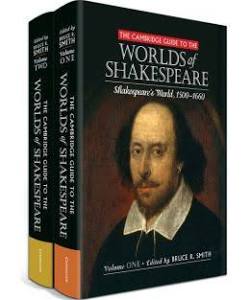 Shakespeare 400's reach goes well beyond the stage, including the BBC comedy series Upstart Crow and Kenneth Branagh's Shakespeare on Screen project; not to mention a flood of entertaining miscellany like a pie chart tallying deaths in the plays or an infographic analyzing characters.
Shakespeare 400's reach goes well beyond the stage, including the BBC comedy series Upstart Crow and Kenneth Branagh's Shakespeare on Screen project; not to mention a flood of entertaining miscellany like a pie chart tallying deaths in the plays or an infographic analyzing characters.



 At one time you worked in a bookstore.
At one time you worked in a bookstore. 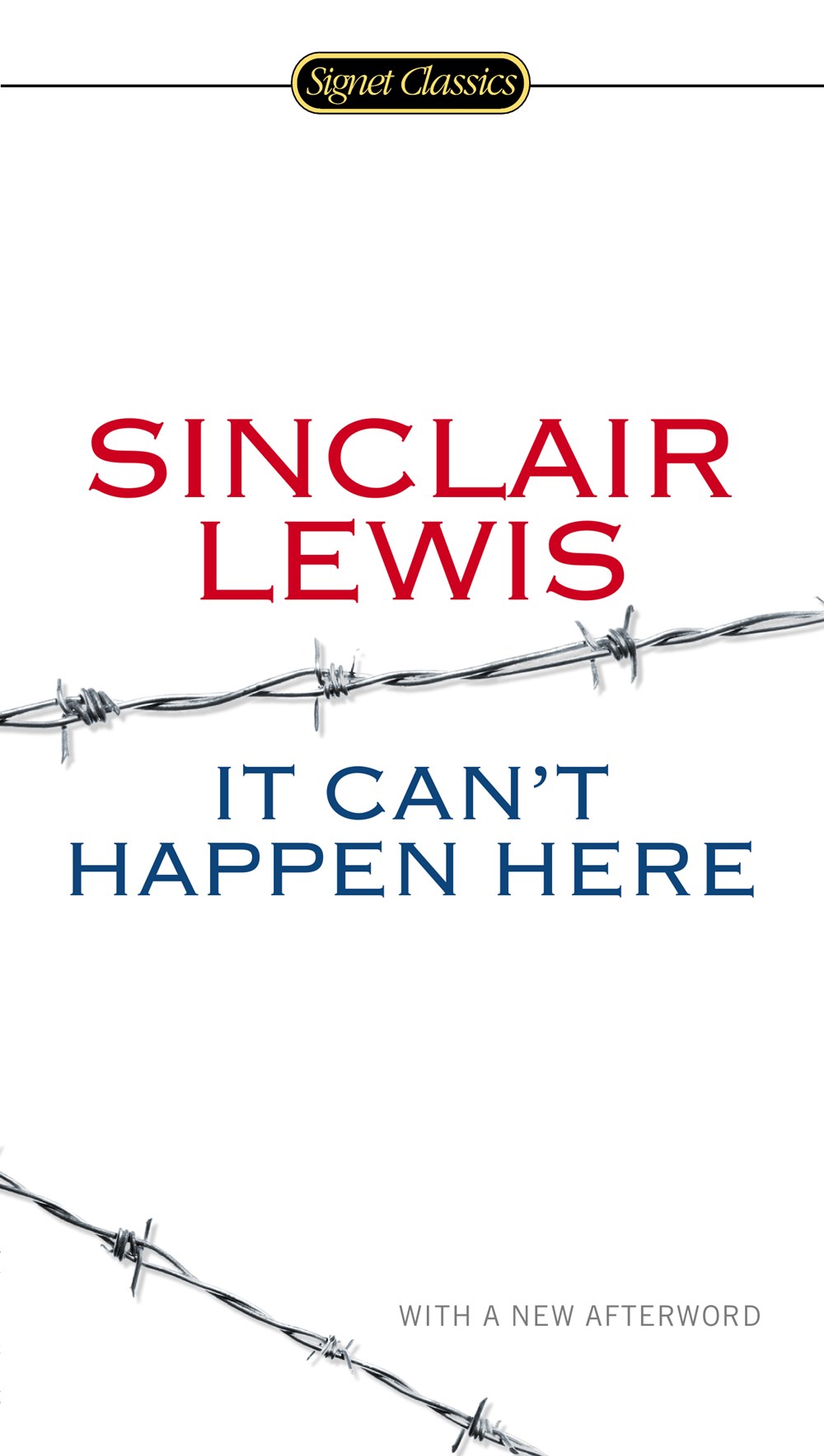 In 1935, Lewis turned his critical eye to American politics and the rise of fascism in Europe with It Can't Happen Here. The novel imagines populist U.S. Senator Berzelius "Buzz" Windrip elected president on promises of drastic economic reforms and conservative social values. Once in power, Windrip seizes total government control with SS-style paramilitary forces à la Adolf Hitler. Most of the plot follows journalist Doremus Jessup's participation in a dissident revolution. The character Windrip bears an unmistakable resemblance to real-life Louisiana politician Huey Long, a firebrand populist assassinated just after the novel's publication but before his planned 1936 presidential run.
In 1935, Lewis turned his critical eye to American politics and the rise of fascism in Europe with It Can't Happen Here. The novel imagines populist U.S. Senator Berzelius "Buzz" Windrip elected president on promises of drastic economic reforms and conservative social values. Once in power, Windrip seizes total government control with SS-style paramilitary forces à la Adolf Hitler. Most of the plot follows journalist Doremus Jessup's participation in a dissident revolution. The character Windrip bears an unmistakable resemblance to real-life Louisiana politician Huey Long, a firebrand populist assassinated just after the novel's publication but before his planned 1936 presidential run.